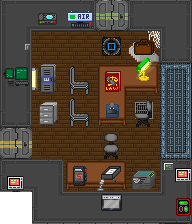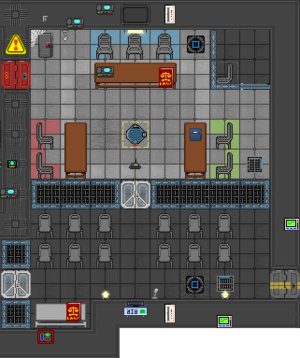Lawyer: Difference between revisions
imported>Kosmos m (Added Ricotez's guide to trials.) |
imported>Ricotez No edit summary |
||
| Line 12: | Line 12: | ||
|superior = [[Head of Personnel]] | |superior = [[Head of Personnel]] | ||
|duties = Advocate for prisoners, create law-binding contracts, ensure [[Security]] is following protocol and [[Space Law]] | |duties = Advocate for prisoners, create law-binding contracts, ensure [[Security]] is following protocol and [[Space Law]] | ||
|guides = [[Space Law]] | |guides = [[Space Law]], [[Guide to Trials]] | ||
}} | }} | ||
Revision as of 15:10, 5 March 2015
| CIVILIAN STAFF | |
  Lawyer |
Access: Law Office, Courtroom, Brig Additional Access: N/A Difficulty: Easy Supervisors: Head of Personnel Duties: Advocate for prisoners, create law-binding contracts, ensure Security is following protocol and Space Law Guides: Space Law, Guide to Trials |
I would like to announce that I believe my client to be a DISGUSTING TRAITOR, and I resent the fact that I've been given the task of defending him. You should probably just toss him out of the airlock or something, I rest my case sir.
The Lawyer is tasked with the thankless job of providing legal aid to the crew. This tends to involve defending Traitors in trials, suing Security or the company or aliens or anyone else they can think of for endangering the crew. Other duties include hassling the engineers and scientists over health and safety violations, and general ambulance-chasing.
Duties
- Consult on Space Law. Be present when people are imprisoned, so you can give the correct time. You should keep Space Law up in your browser for this; be sure to explain the sentence for each crime and the total time. In some cases you may argue for reduced sentence times based on mitigating factors (e.g. clowning, insanity), but don't push the issue.
- Ascertain guilt or innocence. When a suspect is brought in, check the stories of officers. You may be able to convince them when they either have the wrong person or if they committed a lesser crime than thought. Use your forensics scanner on physical evidence brought against your client ("your client" being any suspect brought in).
- Get medical care for inmates. Because officers usually resume their patrol after arresting somebody, they'll appreciate it if you keep inmates healthy (in the absence of a Brig Medic).
- Clean up the Brig. You're going to spend most of your time here, so keep it clean! The warden needs the help; the brig is one of the messiest places on the station.
- Help released inmates out of the brig. When their time is up, bring them their belongings (sometimes they are kept in the evidence room), help them out of the brig, and make sure the warden or HoS sets their security record to "Released".
- Participate in trials. An unfortunately small part of your job; you can sometimes get trials for inmates scheduled to be executed or when you can convince the HoS that it would be entertaining. Fortunate lawyers may get the chance to defend high profile persons, like wizards.
- Create law-binding contracts. As a Lawyer the easiest and most efficient way to get something done is to create contracts, despite popular belief. There are many different types of contracts but a common one is a contract which requests that both parties do a particular action for the other party; ie: trading helmets. If you display these contracts to the Lawyer Gods, especially contracts that are related to souls, then you MIGHT get something nice from them.
- Litigation. Health, safety, and human rights violations abound on the station, but be warned that actually getting anything done about it will test your law skills.
Justice for All

You begin the round in your office with a blue or purple suit, Brown shoes, a briefcase, With 6 pieces of paper and a pen, a PDA, a Security Radio Headset and a Box.
You'll need to ingratiate yourself with Security personnel; otherwise your shift as lawyer wil likely be fruitless and painful. You have virtually no physical power, but you can accumulate social power. Greet them when you first see them, use titles like "officer" when referring to them, say please and thank you, and generally try to roleplay a friendly fellow crew member. Don't let your speech imply authority, though: your Head is the HoP, not the HoS. Make it clear that your function is to uphold justice, the welfare of your clients, and the good of the station. Do not abuse your security headset or sec will at the least take it away or at the worst brig you for it AND take it away.
In fact, it is advised that, as a lawyer, you not attack Security personnel at all, even when they deserve it (fleeing is acceptable). While it may help in the short run, future shifts may have random beatings if you are seen as a threat. If you're having trouble, seek the HoS's, HoP's, or Captain's help, as appropriate.
But if you can't be bothered to do your job, or more likely nobody is calling for you to help them, then you can always just get some tools from the tool storage and redecorate your office.
How to Trial

Someone has requested a trial? It's now your duty to make sure justice happens.
Difference between Criminal and Private Law
This is an important distinction to make. In the real world, criminal law is everything that you will get sued over by the state, such as murder. Private law is everything that you get sued over by a private party, for instance slander. On the station this would translate as such:
Criminal Law: Everything that is explicitly against Space Law. These cases are prepared for entirely in-house by the Security and Command departments, and typically involve crimes against the crew, the station or Nanotrasen itself.
Private Law: Everything not covered explicitly by Space Law, or that is simply not high profile enough for Security. For example, if the Clown's bike horn is stolen by the Janitor, the Clown can try to sue the Janitor. If the Librarian is spreading slander about the Quartermaster, they may get sued over that by the QM. These cases are prepared for by the Legal Office, maybe with a bit of help from the Detective.
Roles in the Courtroom
The Judge: It is of vital importance that the Judge is an unrelated third party, capable of giving a completely objective verdict. This will usually be the Captain or Head of Personnel for Criminal Law, since the Head of Security is per definition involved in those cases. If the case is Private Law and the HoS is uninvolved, they may act as Judge too.
The Defendant: The person on trial. In rare occasions, this may be multiple people, for instance when an entire cult has been captured at once. Obviously on the side of the Defence. They may be summoned as witness, but only if the Defence does not object to this.
The Defence Attorney: The person who has to protect the Defendant and get them a Not Guilty verdict, or at the very least a lesser penalty. This can be the Defendant themselves if they are confident enough in their own legal skills. The Defence Attorney may never be someone who has something to gain with a Guilty verdict, such as the Head of Security.
The Prosecutor: The person who has to get the Guilty verdict for the Defendant. In Criminal Law, this will be the head of the investigation such as the HoS or Detective, but it can also be one of the Lawyers. In Private Law this is almost always the Lawyer representing the victim.
Witnesses: People who are summoned to the stand for questioning. Both the Defence Attorney and the Prosecutor can call witnesses to the stand, and the Defendant may be summoned in this way if the Defence does not object to it. Usually the first person to be summoned this way is the person who carried out the investigation (probably the Detective), if they are not the Prosecutor. Obviously you cannot summon the Defence Attorney, the Prosecutor or the Judge.
The Bailiff: The person responsible for order in the court room (of course assisted by security officers). This is usually the Warden. They are tasked with fetching witnesses, ensuring that the defendant doesn't escape and listening if anyone is setting up a bomb in the maintenance tunnel next to the court room.
Justice for None
As a traitor, you have closer ties to security than anyone else. Officers may go into the break room alone, and make themselves vulnerable to attack; reducing the number of officers may help even when they aren't your target. Your briefcase can fit the contents of a toolbox in it, but is considerably less suspicious than carrying a toolbox around. It is not difficult to stuff it with tasers and flashbangs if you can acquire them from Security storage. You can also hear security radio, which gives you a lot of intel.
